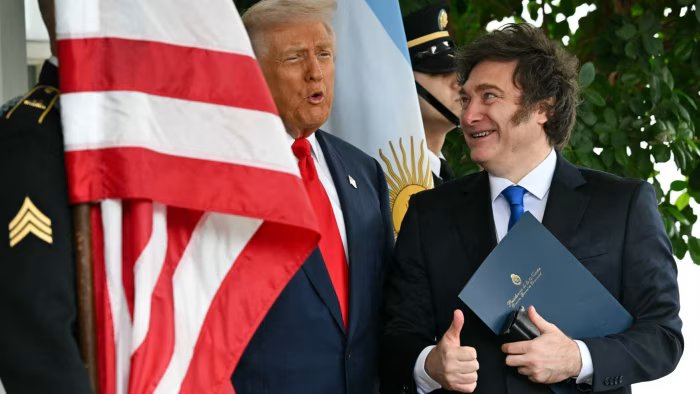Unlock the Editor’s Digest for free
Roula Khalaf, Editor of the FT, selects her favourite stories in this weekly newsletter.
Bets on Argentina delivered profits for a group of emerging market and distressed debt hedge funds last month, as the US bailed out Javier Milei’s government and voters backed his party in critical elections.
Funds such as Shiprock Capital, ProMeritum and Amia Capital benefited from double-digit rallies in Argentina’s US dollar bonds and other assets in October, as US support and the electoral landslide stemmed a run on the peso that had threatened to wipe out the country’s foreign currency reserves.
The bets on Argentina’s swift turnaround come in a standout year for many EM hedge funds that have also gained as the weaker US dollar has boosted currencies across the developing world.
Argentine assets whipsawed from September to October, first selling off on fears that Milei was headed for defeat in legislative elections, then reversing losses as the US rolled out a $20bn credit line to Buenos Aires to help defend the currency.
Argentina’s bonds rallied further after Milei’s coalition won a landslide that is expected to keep his reform programme on track, raising hopes that the country will soon be able to borrow on global markets again.
Shiprock gained 6.4 per cent in October as trades in Argentine bonds lifted the distressed debt and special situations fund to its second highest monthly return since it launched in 2022, according to a letter to investors that was seen by the Financial Times.
Bets on Argentina also increased gains at Broad Reach, an EM-focused hedge fund, to 4.3 per cent last month, a person familiar with its performance said. Meanwhile, hedge fund Amia made money on the nation’s investments including dollar bonds issued by the province of Buenos Aires, with investments across emerging markets pushing the fund up about 15 per cent this year, said a person familiar with the situation.

Some funds had a contrarian buying opportunity when the market plunged after Milei’s party did unexpectedly badly in a Buenos Aires provincial election in September, prompting the US to offer a backstop.
Many domestic investors took the result as an omen for the midterm vote, and Argentina’s dollar bonds due in 2038 in particular slumped to 51 cents on the dollar, giving them a yield of nearly 19 per cent. They are now trading at about 75 cents.
ProMeritum, a London-based credit and fixed-income specialist fund, was up 1.76 per cent in October after it bought Argentine assets following the sell-off in September, a person familiar with its figures said.
Pavel Mamai, managing partner at ProMeritum, said: “We did not have any Argentina exposure before the September elections in the province of Buenos Aires, so avoided the negative impact of that.”
“After this disruption we entered a small long position in Argentina credit and benefited from the surprisingly strong result for President Milei’s coalition in the midterm elections,” he added.
Investors are now focused on whether Milei’s government can source dollars to rebuild its critical foreign currency reserves while keeping the peso’s value within a trading band or whether it will have to allow the currency to trade more freely.
Milei has said he will keep the band, which allows for gradual depreciation of 1 per cent a month, until presidential elections in 2027.
Many investors believe the band is keeping the peso overvalued and making it hard for the government to bolster reserves while individuals and companies are discouraged from bringing dollars into the country. Others say the peso is not as strong as it was and a float is less likely than an alternative of speeding up the band’s adjustment.
Mauro Roca, senior sovereign strategist at Shiprock, said: “I’m not fond of the band as a permanent exchange rate regime but, on the other hand, I don’t think that it is the appropriate moment for Argentina to float.”
“The government has come a long way, but there is still plenty of homework to do,” such as fixing Argentina’s complex monetary policy, Roca added. The authorities will “prefer to maintain the exchange rate bands in place to bring some nominal stability until they think the macroeconomic stabilisation is mature enough”.
The profitable trades on Argentina come as 2025 shapes up to be the strongest year for EM hedge funds since 2017, with managers benefiting from the slide in the dollar relative to many countries.
A strengthening of EM currencies has helped nations such as South Africa, Nigeria and Mexico to keep inflation down while cutting interest rates.
The Emerging Markets Total Index from data provider HFR, which tracks EM hedge funds, was up 17.7 per cent to the end of October compared with 19.4 per cent for the whole of 2017.
“You didn’t have to bet your house on one or two trades, there were so many opportunities,” said one emerging market hedge fund manager.

